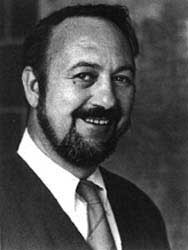Lanzetta, John T.

John Thomas Lanzetta, 63, died on October 6th,1989 in Hanover, New Hampshire (US). The uncertainty about his initially misdiagnosed condition was considerably reduced just before Christmas 1987. Two months later, his youngest son Michael, 26, suddenly died in his sleep. For a long time, in growing and quiet resignation, John prepared a fond farewell to his lifelong partner Jane, his four daughters and oldest son, his six grandchildren, his close friends, coworkers and colleagues.
After a Bachelor in Engineering Physics (Lafayette, 1948) John Lanzetta earned his Ph.D. with a thesis on "Group Behavior under Stress" (University of Rochester, 1952). In 1956 he became Professor of Psychology at the University of Delaware, where he served as chairman of the Psychology Department (1960-1965) and as director of its Center for Research on Social Behavior. During a quarter of a century, from 1965 until his death, he was Lincoln Filene Professor at Dartmouth, the prestigious 1769 Ivy League College, located amidst the natural beauty and New England charm of the Upper Connecticut River Valley region of New Hampshire and Vermont.
There, John's contributions to experimental social psycho1ogy continued a tradition of achievement begun in the study of perception by such well known psychologists as Wolfgang Köhler and Adelbert Ames. From 1971 to 1977, John Lanzetta was editor of the Journal of Personality and Social Psychology, and served on the Editorial Boards of various other social psychology journals, including the European Journal.
John Lanzetta was both a scholar and a scientist. He had a deep commitment to experiment al research on basic problems in social psychology, especially those re1ated to uncertainty, information search and decision-making, and, since 1975, the role of expressive behaviour in emotion. The fact that he never authored nor edited a single book stands in sharp contrast with the
impressive quality of more than fifty published articles and might be just one symptom of his natural modesty. Fortunately, eight of his former research students (Gregory McHugo e.a.) did prepare a Festschrift pulling together all of John's research on emotion done over the past 20 years, published under the title The Power of Faces: The Influence of Facial Expression on Emotion and Social Interaction.
John Lanzetta was not only a prolific student but also a generous practitioner of social interaction. For his wife and family, his students, colleagues and friends, John's massive poise and deep-voiced présence were an unfailing source of strength, solid scrutiny, advice, comfort and effective caring.
For many European social psychologists John Lanzetta will remain the self-effacing initiator of social interactions which were crucial for the early development of the European Association of Experimental Social Psychology and, by implication, of the European Journal of Social Psychology.
